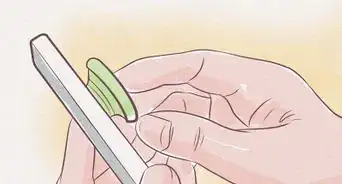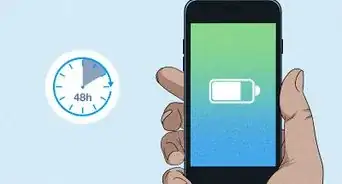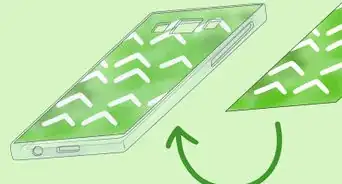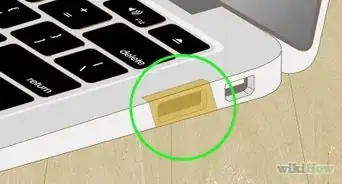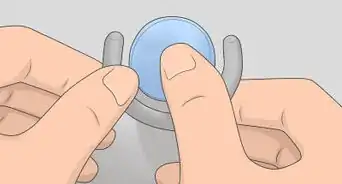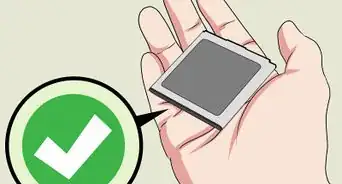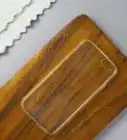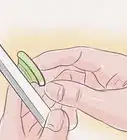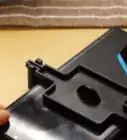This article was co-authored by wikiHow Staff. Our trained team of editors and researchers validate articles for accuracy and comprehensiveness. wikiHow's Content Management Team carefully monitors the work from our editorial staff to ensure that each article is backed by trusted research and meets our high quality standards.
There are 8 references cited in this article, which can be found at the bottom of the page.
This article has been viewed 132,677 times.
Learn more...
Whether it's a set of headphones, new charger cables, or a handsome phone case, when you buy accessories for your phone, you want them to last. Sadly, that's not always the case. When you buy a new phone case, it tends to fit tight and snugly around your mobile device, giving it the protection it deserves. But, some phone cases can stretch or wear out over time. Specifically, phone cases made of silicone (or having a silicone component) tend to become loose over years of use. Don't worry, it's amazing what a little boiling water can do.
Things You Should Know
- Boil a pot of water to heat up your silicone case.
- Make sure to use tongs when handling the hot silicone case.
- Set up a bowl of cold water to cool and shrink the case.
Steps
Boiling the Case
-
1Bring a pot of water to a boil. Ensure that there is enough liquid to submerge the phone. Treat it like you're boiling a pot of pasta, only with entirely inedible plastic instead of linguine.
- Make sure that the only thing you are placing in the water is the silicone material. Do not put your phone in the boiling water! If there are hard plastic components to your case, make sure to remove those from the silicon before continuing.[1]
-
2Lower your case gently into the boiling water. Allow the case to heat up for 30 seconds to 1 minute. As the case heats up, it will expand. This will ensure that the phone case becomes malleable and workable.[2]
- Ensure the case doesn't touch the bottom or sides of the cooking vessel to avoid melting the case.
Advertisement -
3Use a pair of tongs throughout the process. While your phone jacket is taking a hot bath, your hands and fingers should steer clear. You will want to use a good set of tongs that you're comfortable manipulating, to move the case about the water as it heats.[3]
Cooling and Refitting
-
1
-
2Remove the case from the cold water after 30 seconds to 1 minute. The case does not need to be ice cold when you remove it, but you should be able to pick it up with your hands. If the case is still somewhat warm to the touch, that's okay as long as it has significantly cooled down.[6]
- Your cold water bath doesn't need to be ice cold, but it should be sufficiently cold enough to cool the hot phone case. The colder the water bath, the less time it will take to move on to the next step.
-
3Dry the silicone casing thoroughly. Find a clean kitchen or dish towel with which you can completely wrap and dry the phone case. You need to ensure that the material coming in contact with your phone is free from water to avoid damaging the phone itself.[7]
- If you don't have a dish towel, a large towel will work. Again, ensure the towel is clean, as the dried case is going back on your phone.
- Avoid using paper towels. Bits of paper might get caught in the case.
- Similarly, avoid using hand dryers provide, as the direct heat could comprise the integrity of the case.
-
4Refit the silicone case back onto your phone. As the silicone material continues to cool, it will continue to shrink, fitting more securely on the components of the phone case or the phone itself. Once completely cooled, you should have a phone case that is tighter and regained some of its original form.[8]
References
- ↑ https://www.youtube.com/watch?v=ynVG4xUFgcE&feature=youtu.be&t=21
- ↑ https://www.youtube.com/watch?v=wvIl4qQ9H48&feature=youtu.be&t=54
- ↑ https://www.youtube.com/watch?v=M2R0A6-lFDg&feature=youtu.be&t=52
- ↑ https://www.youtube.com/watch?v=ynVG4xUFgcE&feature=youtu.be&t=88
- ↑ https://www.engr.psu.edu/ce/courses/ce584/concrete/library/cracking/thermalexpansioncontraction/thermalexpcontr.htm
- ↑ https://youtu.be/M2R0A6-lFDg?t=94
- ↑ https://www.youtube.com/watch?v=wvIl4qQ9H48&feature=youtu.be&t=187
- ↑ https://www.youtube.com/watch?v=ynVG4xUFgcE&feature=youtu.be&t=138
